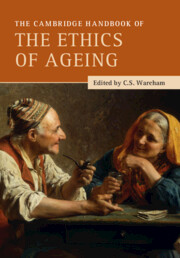Book contents
- The Cambridge Handbook of the Ethics of Ageing
- Cambridge Handbooks in Philosophy
- The Cambridge Handbook of the Ethics of Ageing
- Copyright page
- Contents
- Contributors
- Acknowledgements
- Introduction
- Part I Ageing and the Good Life
- 1 Old Age and the Preference for the Future
- 2 Ageing and the Temporality of the Good Life
- 3 Children’s Prudential Value
- 4 The Ethics of Ageing in Frank Perry’s The Swimmer
- 5 Is Ageing Good?
- 6 Mental Health in Old Age
- 7 In Defense of a Semi-Stoical Attitude about Ageing and Death
- Part II Ageing and Morality
- Part III Ageing and Society
- References
- Index
7 - In Defense of a Semi-Stoical Attitude about Ageing and Death
from Part I - Ageing and the Good Life
Published online by Cambridge University Press: 23 August 2022
- The Cambridge Handbook of the Ethics of Ageing
- Cambridge Handbooks in Philosophy
- The Cambridge Handbook of the Ethics of Ageing
- Copyright page
- Contents
- Contributors
- Acknowledgements
- Introduction
- Part I Ageing and the Good Life
- 1 Old Age and the Preference for the Future
- 2 Ageing and the Temporality of the Good Life
- 3 Children’s Prudential Value
- 4 The Ethics of Ageing in Frank Perry’s The Swimmer
- 5 Is Ageing Good?
- 6 Mental Health in Old Age
- 7 In Defense of a Semi-Stoical Attitude about Ageing and Death
- Part II Ageing and Morality
- Part III Ageing and Society
- References
- Index
Summary
Nearly everyone considers death to be a terrible harm and mortality a very sad feature of human existence. Consistent with this attitude, most people seem to believe that getting older (at least once we have grown up) is regrettable insofar as it brings us closer to death. Is it sensible to fear death and the ageing process that brings us closer to it? After rejecting one philosophical strategy for stoicism about death, I will contend that it is most reasonable not to fear death and ageing if we reach, or are likely to reach, the age of life expectancy with a decent quality of life. My first argument for this thesis appeals to what we can reasonably expect out of human life. My second argument appeals to the wisdom of overcoming what I will call our tendency towards “cosmic narcissism.”
- Type
- Chapter
- Information
- The Cambridge Handbook of the Ethics of Ageing , pp. 92 - 102Publisher: Cambridge University PressPrint publication year: 2022

